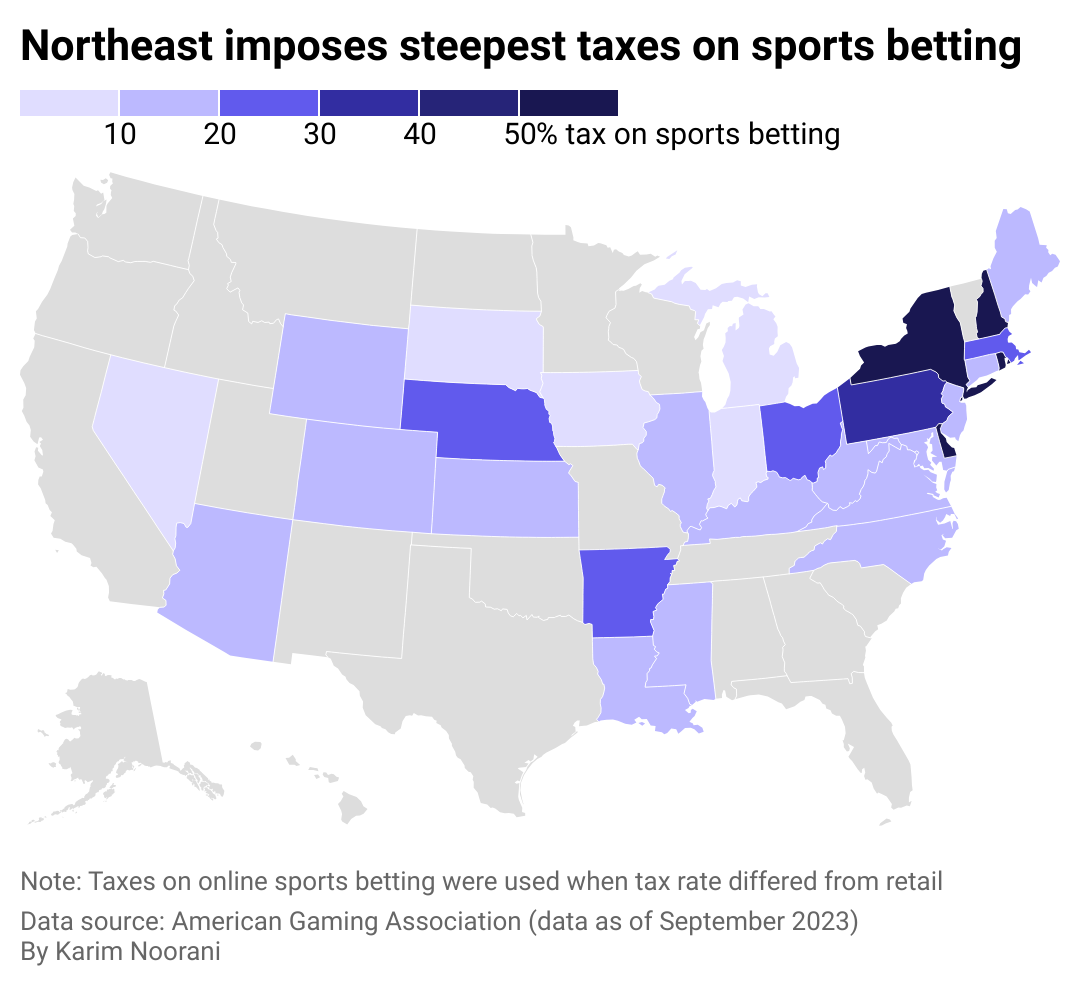States with the lowest taxes on sports betting
wavebreakmedia // Shutterstock
States with the lowest taxes on sports betting
Businessman using smartphone with gambling app.
State and local governments across the United States have relied on the commercial gaming industry to buffer its coffers for decades. In 2018, the national gaming landscape would change after the Supreme Court permitted states to offer sanctioned sports betting. Within a year, 11 states and the District of Columbia authorized wagering. Now, 38 states have legalized sports betting.
The emergence of sports betting has also sparked differences in how state and local governments tax the revenue it generates. Since May 2018, bettors across America have wagered more than $220 billion with U.S. sports betting operators, according to the American Gaming Association. The results have generated $3 billion in tax revenue for states, but those returns have varied based on each jurisdiction’s tax rates.
AskGamblers used data from the American Gaming Association to map the tax rates of all states where sports betting is legal. Each state with authorized sports betting in the U.S. determines its own tax rate and the allocation of revenue. Tax rates differ based on several factors, including state regulations and market size.
![]()

AskGamblers
Nevada ties for lowest sports betting tax rate in the US
A map depicting sports betting tax rates across the US. Northeast has some of the highest taxes on sports betting in the country.
States that offer some of the lowest tax rates on online sports betting include Nevada, Iowa, and Indiana—three jurisdictions that authorized wagering before 2020. Nevada has a 6.75% tax rate and taxes sports betting revenue at the same rate as Iowa. States like Tennessee offer low tax rates of 1.85% but are taxed based on betting handle.
In some states, tax rates can change depending on whether the bets were placed at brick-and-mortar facilities or online. In these cases, tax rates indicated in the map were those for online sports bets.
The Northeast has imposed heavier tax rates on sports betting revenue. New York—America’s largest online gaming market in 2022—tied for the highest tax rate on online sports betting revenue at 51% with New Hampshire.
New Hampshire, which went live with online wagering in 2019, has only one legal sportsbook—DraftKings. From July 1, 2022, to June 30, 2023, the Granite State generated $69 million in online gross gaming revenue, earning the state $31.7 million.
Read on to see the ranking of the five states with the lowest taxes on sports betting. Tax rates will be at the forefront of pending regulation as more states authorize sports bettings.

Canva
#5. Michigan
A view across the river of the Detroit skyline.
– Online sports betting tax rate: 9.65%
– Legalization date: Dec. 20, 2019
– Tax allocation: School Aid Fund and $2 million annually goes to helping firefighters undergoing cancer treatments

Canva
#4. Indiana
Downtown Indianapolis with blue sky.
– Online sports betting tax rate: 9.5%
– Legalization date: May 13, 2019
– Tax allocation: State general fund, with a set share going to fund solutions for problem gambling

Canva
#3. South Dakota
An aerial view of Rapid City, South Dakota.
– Online sports betting tax rate: 9%
– Legalization date: March 18, 2021
– Tax allocation: Distributed across a variety of state initiatives, with a special emphasis on Lawrence County

Canva
#1. Iowa (tie)
The Des Moines, Iowa skyline.
– Online sports betting tax rate: 6.75%
– Legalization date: May 13, 2019
– Tax allocation: State general fund

Canva
#1. Nevada (tie)
A distant view of Reno, Nevada at dawn.
– Online sports betting tax rate: 6.75%
– Legalization date: 1949
– Tax allocation: State general fund, with education and health services key recipients
This story originally appeared on AskGamblers and was produced and
distributed in partnership with Stacker Studio.





